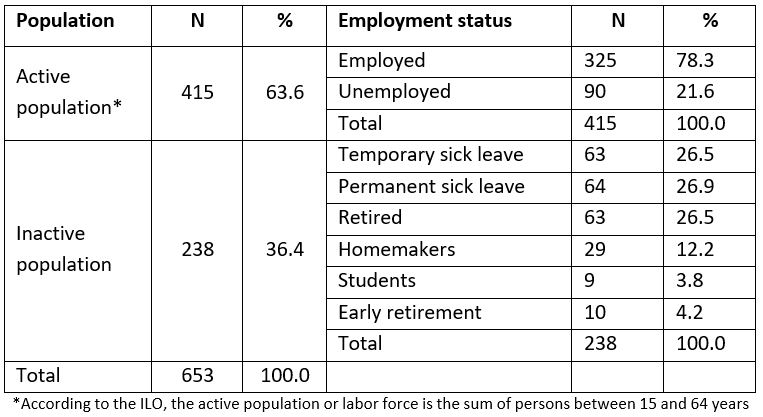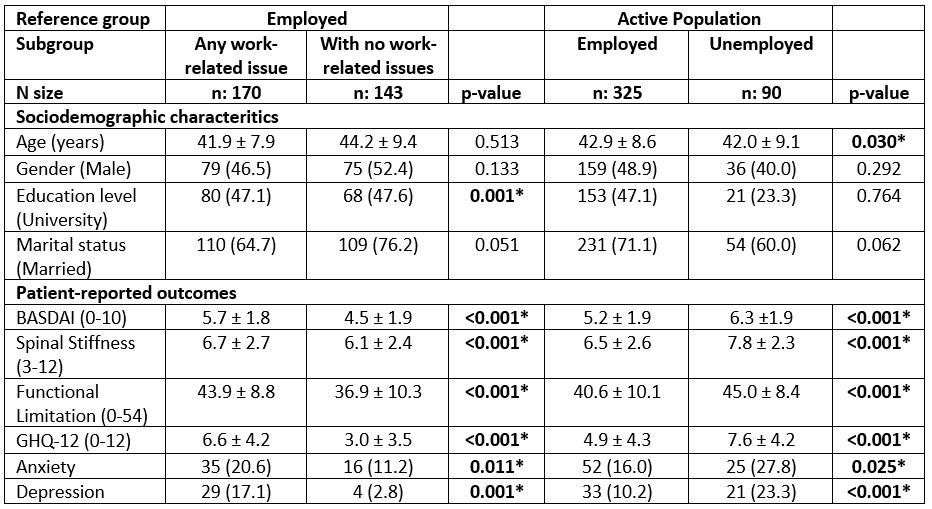Session Information
Date: Monday, November 9, 2020
Session Type: Poster Session D
Session Time: 9:00AM-11:00AM
Background/Purpose: Axial spondyloarthritis (axSpA) impacts negatively on multiple dimensions of patient’s life, including their working life. The present study aims to evaluate working status, work-related issues and their associated factors in a Spanish sample of patients with axSpA.
Methods: The Atlas 2017 based its results on an extensive cross-sectional patient survey conducted in Spain (2016), validated by a multidisciplinary group of experts on spondyloarthritis. Participants were recruited through an on-line panel and patient organizations. Participants were classified as active (employed, unemployed between 15-64 years) and inactive (retirees, on sick leave, students and homemakers). Those employed were asked to report work-related issues due to axSpA (sick-leave, difficulty fulfilling work hours, missing work for doctors’ appointments, reducing working hours or taking days off) in the past 12 months. Diagnostic delay, disease activity (BASDAI), spinal stiffness (3-12), functional limitation (0-54) and psychological distress (General Health Questionnaire, GHQ-12 [0-12]) were compared between employed patients with or without work-related issues using a Mann-Whitney and Kruskal-Wallis test. Regression analysis was conducted to determine explicative disease outcome related factors (enter method for BASDAI, self-reported spinal stiffness, functional limitation and GHQ-12) over work-related issues.
Results: Data from 680 patients were collected: mean age was 47±11 years, 52.5% were female and 36.9% were university educated. Mean disease duration and diagnostic delay were 20.9±12.2 and 8.5±7.7 years, respectively, and mean BASDAI was 5.5±2.2. A total of 63.6% (n=415) were considered active population, of which 49.8% (n=325) were employed (Table 1). Of those employed, 54.3% reported a work-related issue, specifically 37.1% took sick leave, 44.1% had difficulties in fulfilling the working hours and 42.9% missed work due to doctor’s appointments (Table 2). Among all patients, 95.5% faced (or believed they would) difficulties finding a job due to axSpA. Experiencing work-related issues due to axSpA was significantly associated with higher disease activity, self-reported spinal stiffness, longer diagnostic delay, higher functional limitation and higher level of psychological distress (p< 0.001). However, the highest levels of disease burden were reported by unemployed participants (Table 3).
Conclusion: Results reveal a relevant impact of axSpA in patient working life. Approximately two out of three patients employed experienced work-related issues due to axSpA, being associated to worse disease outcomes and poorer psychological health. However, those who were unemployed faced a harsher situation reporting even poorer disease-related and psychological health outcomes. As psychological health appears impaired severely in axSpA patients regardless of their employment status it should be key for a holistic approach to patient care.
 Table 1. Employment status of survey respondents
Table 1. Employment status of survey respondents
 Table 2. Frequencies of work-related issues surveyed among employed respondents
Table 2. Frequencies of work-related issues surveyed among employed respondents
 Table 3. Differences between employees with/without work-related issues and between employed/unemployed participants in relation to sociodemographic characteristics and patient-reported outcomes
Table 3. Differences between employees with/without work-related issues and between employed/unemployed participants in relation to sociodemographic characteristics and patient-reported outcomes
To cite this abstract in AMA style:
Garrido-Cumbrera M, Collantes-Estévez E, Navarro-Compán V, Zarco P, Sastre C, Sanz-Gomez S, Correa-Fernández J, Gratacós J. Patient-reported Impact of Axial Spondyloarthritis on Working Life. Results from the Spanish Atlas 2017 [abstract]. Arthritis Rheumatol. 2020; 72 (suppl 10). https://acrabstracts.org/abstract/patient-reported-impact-of-axial-spondyloarthritis-on-working-life-results-from-the-spanish-atlas-2017/. Accessed .« Back to ACR Convergence 2020
ACR Meeting Abstracts - https://acrabstracts.org/abstract/patient-reported-impact-of-axial-spondyloarthritis-on-working-life-results-from-the-spanish-atlas-2017/
